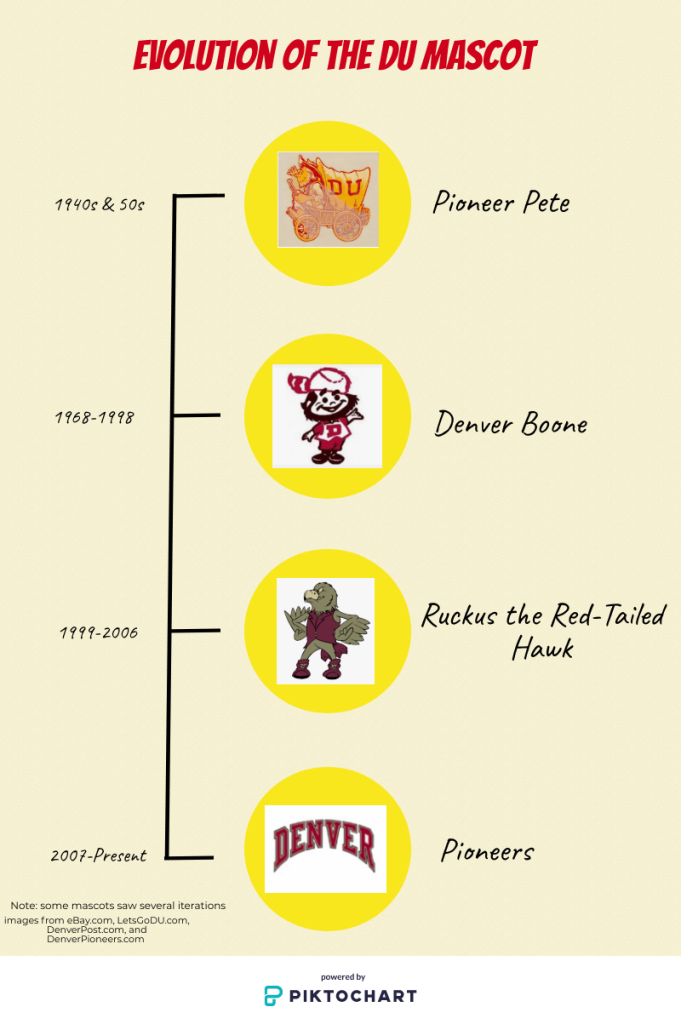According to the article “The Mascot Slot: Cultural Citizenship, Political Correctness, and Pseudo-Indian Sports Symbols” published in the Journal of Sport and Social Issues, the Native American caricatures that many colleges and professional sports teams have as mascots would not be allowed if they portrayed any other racial or ethnic group. Sensitivity to culturally appropriative Native American mascots has somehow been disregarded, as the Roper Poll clearly illustrates as well.
The University of Denver has faced this issue itself. From 1968 to 1998, the DU mascot was the Denver Boone, a stout and rugged young man with a coonskin cap. The Denver Boone took inspiration from Daniel Boone, an iconic frontiersman and early settler who no doubt had a hand in the bloodshed of Native Americans. After retiring the Denver Boone, DU tried to replace the mascot with “Ruckus the Red-Tailed Hawk”, but without any real connection to the DU community, Ruckus was short-lived.

After Ruckus, Denver was left with the moniker the “Pioneers” for the DU community to rally around. However, the word pioneer carries its own baggage. DU sophomore and member of the Native Student Alliance (NSA) Chloe Karionahawe explained that it is hard to hear people using the word pioneer without any consideration for what it means. However, Karionahawe is not judgemental, she simply hopes that people are educated about what they are saying and that they stop.
“I’m not from a Western tribe and I even didn’t know the history before I came, I was saying ‘go Pios’,” said Karionahawe. “Then someone checked me. Now when I hear it, it’s kind of like this twinge that I get. I’m very hyper aware of it.”
During her time at DU, Karionahawe has witnessed some small changes regarding the use of the word pioneer.
“I’m on the club lacrosse team and the girl who leads the cheers has started saying ‘Go Denver’ instead, which is even huge,” she said.
Despite this progress, Karionahawe is not optimistic about the administration changing the Pioneer moniker any time soon.
“We’ve (NSA) been trying to get it changed for years now. It’s just really hard with the people who put so much money into the school,” she said.
She is referring to the fact that stakeholders and alumni do not want to see the moniker changed.
In October of 2017, NSA launched their “No More ‘Pios’” campaign. During a hockey game that year, NSA bought out the entire student section and unrolled a large banner during halftime that read “No More Pioneers”.
“That was a huge deal because obviously alumni and sponsors who feel very strongly about the mascot [moniker] were there,” said Karionahawe.
Still, the Denver “Pioneers” remained. Jasmine Pulce, Assistant Director of Affinity Group Support at DU, seems to have the same outlook about replacing “Pioneers” as Karionahawe.
“The moniker conversation is so divisive. I would be shocked if it goes anywhere any time soon,” Pulce said.
But like Karionahawe, she has also seen small changes at DU. There is an awards ceremony every spring that celebrates outstanding students and they recently changed the highest award from the “Pioneer Award” to the “Crimson and Gold Award”. Additionally, Pulce cites a shift in the definition of “pioneer”. There is somewhat of a conscious shift for “pioneer” to be seen as a verb rather than a noun.
“It is centered around being the first, breaking ground,” said Pulce.
Another article published in the Journal of Sport & Social Issues discusses the damaging implications of an entire university taking on the identity of an Indian mascot. The article explains that the use of Native American mascots makes “Indianness” tolerable in terms that are acceptable to Whites, where it is not tolerable otherwise.
Although DU’s mascot (or moniker) is not a culturally appropriative Native American caricature, it is one that slaughtered Native Americans in relentless pursuit of a goal. And it is problematic and hurtful for the University of Denver to say we are Pioneers, especially considering the university was built on Cheyenne and Arapaho land.
Despite the solid ground that the Native Student Alliance stands on when they ask the administration to change the moniker, the administration is not likely to take major action on these demands any time soon.
“I don’t know if they’re focused on it at all,” admitted Pulce. “The administration is focused on low hanging-fruit. Easy wins where they can make changes right now.”
The moniker issue will not be an easy change.
Karionahawe and the Native Student Alliance understand why it is such a slow-moving fight as it is in the hands of people who fund the university, but they have not given up. They plan to continue to bring it up to the university with the understanding that change is probably not in the near future.
“It’s tricky because we obviously don’t want any of the funding to go away either because that would affect students. At the same time, though, this is something that is affecting our lives.”